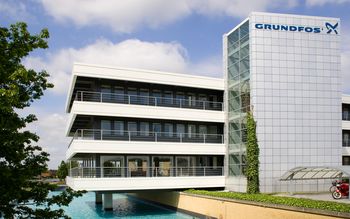The Danish company Grundfos is the world's largest manufacturer of pump solutions, and with its focus on students, in 2017 the company entered into a strategic agreement with Aarhus University to promote collaboration with students. This will benefit the students, the university and Grundfos.

More than 100 university students from all over Denmark have collaborated with the pump company Grundfos in Bjerringbro in the course of 2019, and this collaboration with students is a high priority for the company. This is part of the reason why, in 2017, Grundfos entered into a strategic collaboration agreement with Aarhus University.
- We’ve been working with AU for many years, and we’re very pleased with the collaboration around and with students in particular. They’re very talented and contribute value-adding work, so it’s only natural to enter into an agreement which, among other things, makes collaboration with students easier and more structured, explains Henrik Ørskov Pedersen, head of core technology and responsible for research collaboration at Grundfos.
The strategic collaboration agreements, Aarhus University enters into with selected partners in Denmark and abroad consist of different focus areas, which vary from agreement to agreement. However, interest in collaborating on and with students is very important.
- It means a lot for our students’ degree programmes that companies want to get involved in an interplay on getting new, well-educated people out into industry, while at the same time making them even more attractive as future resources in private companies, says Vice-dean Kurt Nielsen.
Grundfos is well-known for its water pumps, and with a centre like the Centre for Water Technology, WATEC, which has been established with support from the Poul Due Jensen Foundation, Aarhus University is proud to be able to exchange knowledge and collaborate with the Bjerringbro company, says Kurt Nielsen.
- The world is evolving, and so is collaboration. The university becomes stronger by collaborating with companies such as Grundfos, and vice versa. This creates new opportunities for development. Grundfos has interesting issues and knowledge that students and researchers at the university can research further. We're very grateful for this, says Kurt Nielsen.
This was very apparent in the summer of 2019, when 48 students from 13 countries went to Aarhus to find solutions to the world's waters challenges at WATEC's first summer school. Grundfos was one of the supporting companies behind the event, where the students worked with questions about managing groundwater resources and sewage. The summer school was a great success.
Meetings with graduates, student research projects and teaching at the university. These are some of Grundfos’ activities at Aarhus University, because it is important to establish contact with the academic brains,” explains Henrik Ørskov Pedersen.
- The battle for talents will become increasingly hard, and we can see that it is a good idea to recruit academics where we collaborate closely with both students and departments, says Henrik Ørskov Pedersen.
However, this is not the only benefit of engaging with the students.
- By supporting research into our challenges and knowledge, we set a course makes sense to us. We also create graduates with exactly the skills we’re looking for, so we can secure a recruitment pipeline, he explains.
A strategic collaboration agreement between Aarhus University and a company extends over an agreed number of years, after which the agreement may be extended. The long collaboration period opens up for more and better research, says Vice-dean Kurt Nielsen.
- The framework for the agreement offers the opportunity to exploit a great potential. Collaboration over a number of years benefits both Grundfos and the university, because the long-term perspective is important for research. Research breakthroughs are not something you do in six months. It takes time, he explains.
The head of core technology at Grundfos, Henrik Ørskov Pedersen, is also looking forward to seeing how much comes out of the strategic agreement.
- The collaboration agreement gives us each access to relevant knowledge and paves the way for more student education and the development of good research which can also be globalised. It's very exciting to be part of it all, and we’ll have to wait and see whether the agreement is extended, he says.